I can pinpoint the moment I began to reconsider living room design. There I was, standing in my new, empty apartment. Each stark wall of the living room felt like it was caving in, making the very limited space feel smaller by the second. Wow—this living room is tiny and impossible, I thought. But after standing there for several minutes, I had a realization: The room wasn’t lacking. It was a groundswell of opportunity to get creative with my décor. That’s when I started to dive deep into the small living room ideas that would make the most of my space.
Truthfully, many of us fall into a living room rut. (The TV goes there, sofa over there, lamps on the side…) But space limitations, so often present in city apartments and smaller homes, can unlock a wave of creativity. A compact room challenges you to consider—and honor—every inch of real estate you have. “Smaller spaces require a little more thought and planning, especially multi-functional spaces, such as a living room,” says San Francisco-based interior designer Regan Baker. “It’s important the room feels inviting and comfortable, given the space constraints, but also because it is so multi-functional and high-use.”
So where do you begin to tackle the living room when space is premium? Baker believes you start by considering the function, flow, and proportions in the room. And as the following several other interior designers allude to below, it’s important to lean in and have fun with what you’ve got. Stay with me as I reveal these designers’ top 10 small modern living room ideas to implement into your home. As you’ll see, with a few tips and tweaks, limited space can actually be a catalyst for your interior design dreams.
Idea #1: Embrace Built-Ins
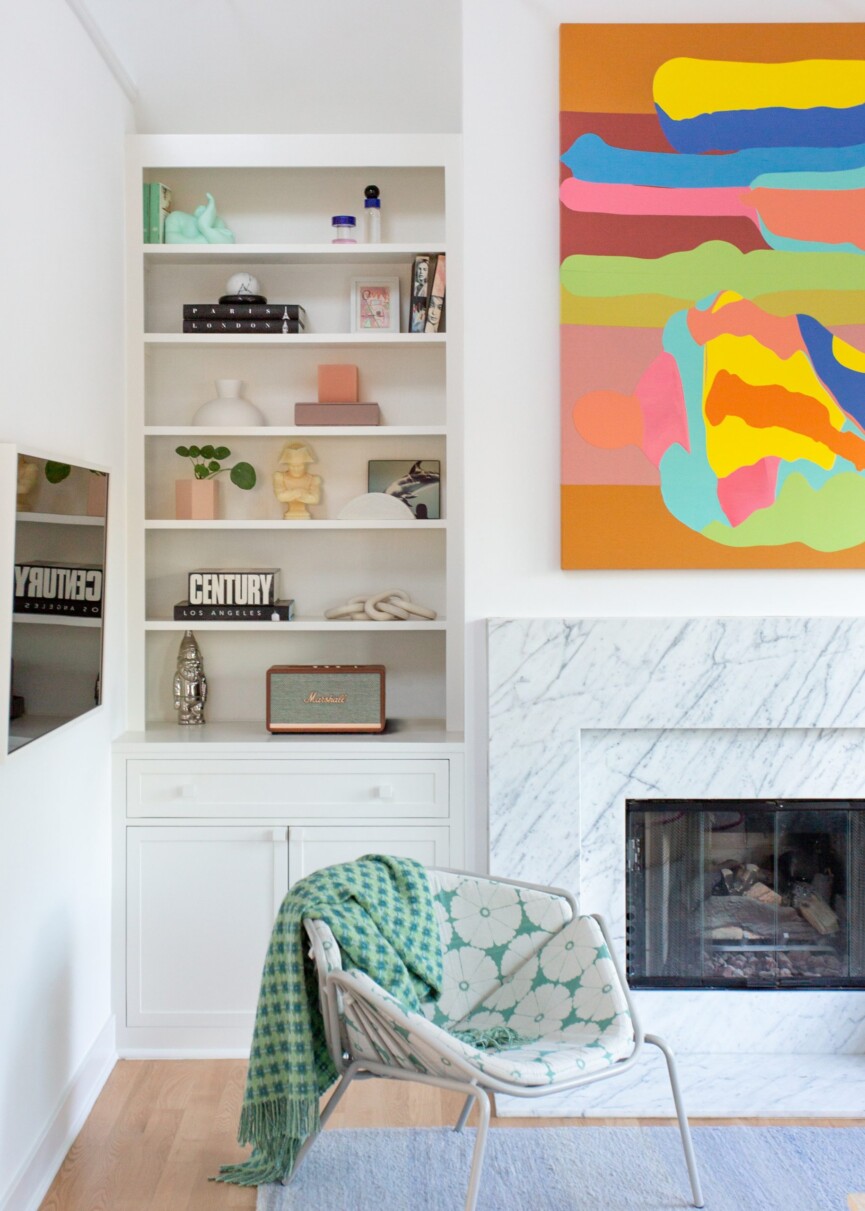
Above photo courtesy of Regan Baker Design.
Famed architect Frank Lloyd Wright was known for the flow and functionality he imbued in his homes. Much of this came from his love of built-in shelving and seating. This tactic is a giant small-space win in Regan Baker’s eyes. Built-in shelving offers functionality in the correct proportions for a room, says the interior designer and founder of Regan Baker Design. Furthermore, built-ins “bring more texture into the space rather than a standout piece that feels like another adorned piece of furniture,” she says.
Idea #2: Honor Every Anchor Piece
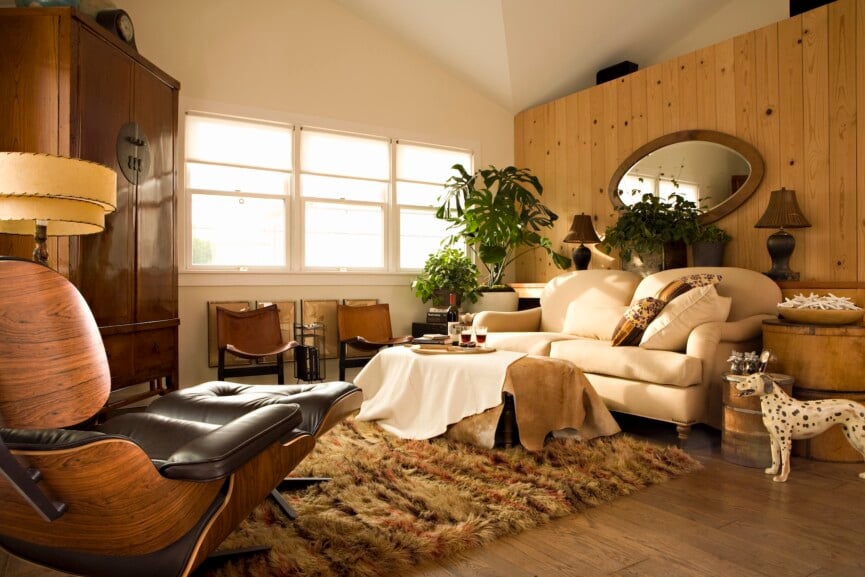
Above photo by Karyn Millet, courtesy of Hub of the House Studio.
Consideration is the gold mine of all positive décor decisions. This means we must love and appreciate what we choose to have in our homes. This approach is essential when space is limited, implores Karen Harautuneian of Hub of the House Studio. “Every piece of furniture must be both comfortable and usable,” she says of a small space living room. “Always start with a solid, simple space plan that includes the main anchoring pieces—then build around those pieces.” In Harautuneian’s case, these “anchoring pieces” include a sofa, ottoman, and armoire.
Idea #3: Encourage Flow With Less Furniture
It’s a common mistake: an attempt to compensate for lacking space with extra furniture. While it may seem like the right move, it cramps the flow and makes the room feel smaller, says Regan Baker. “Too much furniture, or too big or small an item in the room, can really alter the overall feel of a home and whether or not it is inviting,” she says. “The true goal for an ideal living room, no matter the size, is that it is inviting and flowing for all the functions it hosts,” continues Baker. So rethink that additional table and consider negative space a worthy accessory.
Idea #4: Welcome a Simple Color Palette
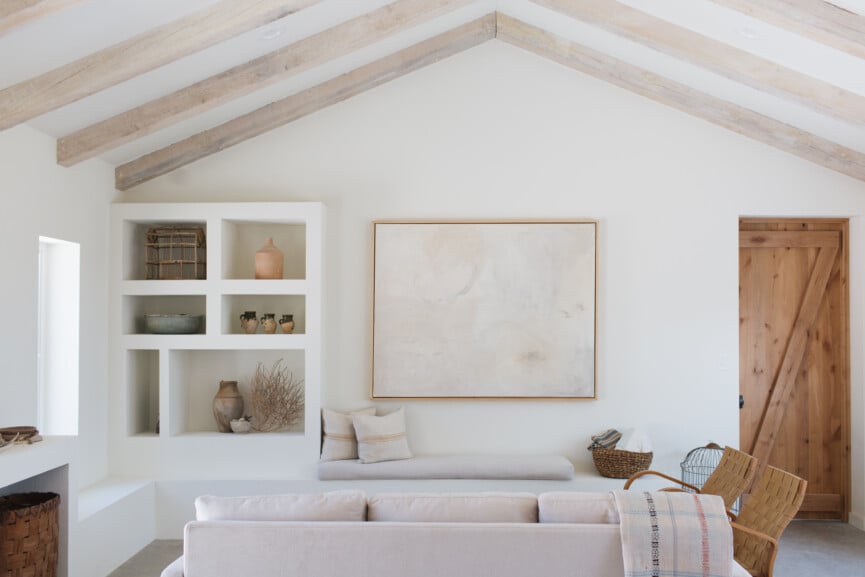
Above photo by Kate Zimmerman Turpin.
When it comes to smaller living rooms, simplicity is an asset. This holds true for the shades on the walls and the color of the décor accessories. Uncomplicated is the ticket, believes Harautuneian, who leans toward natural tones in smaller living room spaces. “In my living room the rug, fabric, and leather palette were derived from the natural wood tones of the pine wall paneling, bird’s eye maple nesting tables, and the end table made from stacked antique wood hat boxes,” she tells us. One note: Simple can mean concentrated and rich tones, such as deep greens or purples. Just aim to keep them flowing and complementary to one another.
Idea #5: Plan Plan Plan
This is where the complacency kicks in: It’s common to think a living room designs itself, with the sofa going against the wall, the coffee table in front, and so forth. Truth be told, a well-designed living room starts by taking a close look at the space. Planning the layout is “imperative,” implores Amy Youngblood, principal designer and owner of Amy Youngblood Interiors. Taking into account the flow and size will help you determine which furnishings to choose for a small modern living room. “It will also prevent expensive mistakes when purchasing furniture,” says Youngblood. You can draw the room on a piece of paper or get more technical by using design software such as Autocad.
Idea #6: Incorporate Stunning Drapes
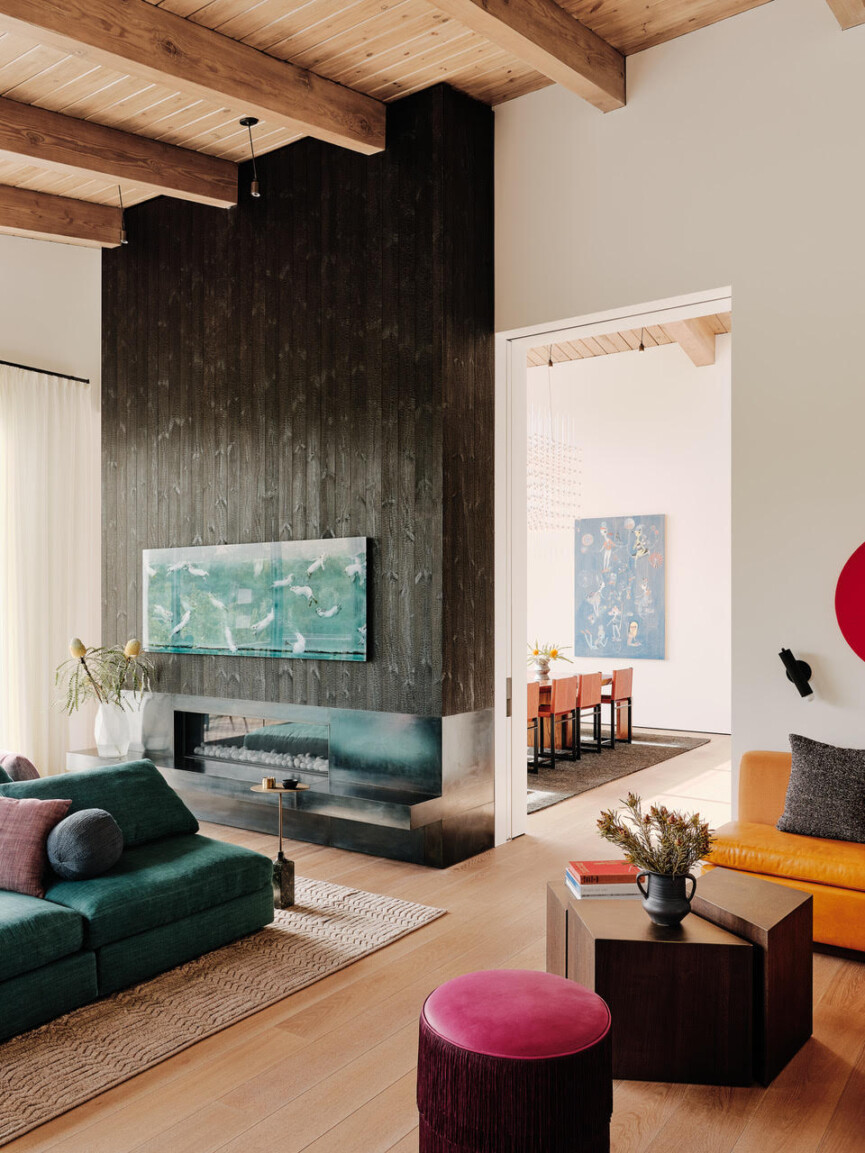
Above photo courtesy of Butler Armsden Architects; design in collaboration with Katie Martinez Design.
Not just any drapes, of course. Consider floor-to-ceiling window treatments in sheer fabrics. The reason for the length is because it gives a small living room more height, says Trisha Snyder of Butler Armsden Architects, and organically invites the eyes to look up (thus proving there is always more to appreciate in a space). This tactic also lightens a room, adds Snyder. It allows for natural rays to shine through and envelope a smaller room.
Idea # 7: Bring In the Multi-Functionality
If there is a rallying cry for design and décor trends of 2022 it is that multifunctionality is queen. We work and play and relax where we live, so every piece must have a nuanced purpose. In small living rooms, aim for every large piece to have a dual role. Regan Baker is a huge fan of incorporating grand poufs that serve as ottomans and can store beneath a coffee table. She echoes the sentiment for built-in pieces, stating that a built-in bookshelf can also serve as a desk in a smaller living room. And don’t shy away from considering using a grand coffee table as a place to dine. Karen Harautuneian shares these sentiments: “Every piece of furniture must accommodate both larger group gatherings and solo moments, like putting your feet up after a long, satisfying day.”
Idea #8: Maximize Seating and Lighting
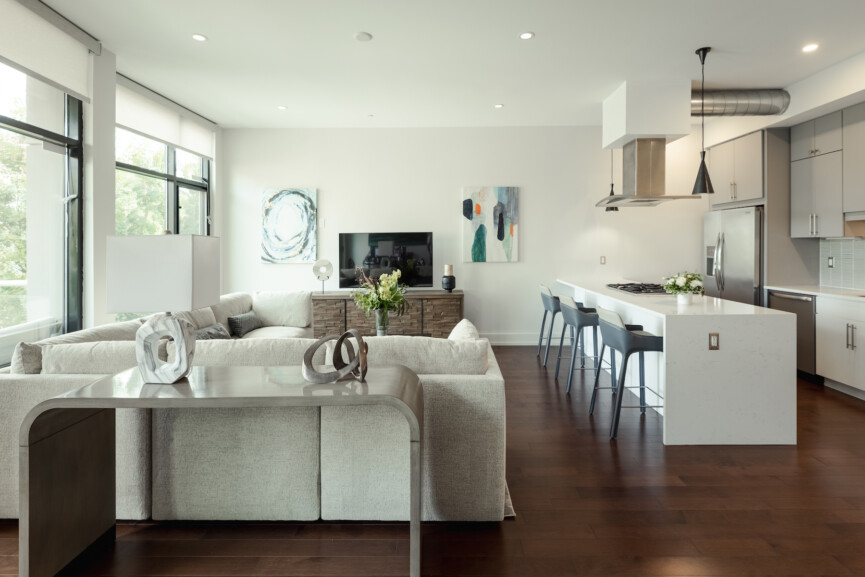
Above photo by Joe Binford, courtesy of Amy Youngblood Interiors.
Even though a smaller living room offers less linear space, there is always ample opportunity to work with vertical real estate. Amy Youngblood likes to do this by laying out maximized seating for various activities—i.e. everything from flat surfaces for drinks to comfortable places to lounge. Regan Baker expands on this idea by incorporating layered lighting that supports the multiple functions of the living room.
Idea #9: Think Outside the (Sofa) Box
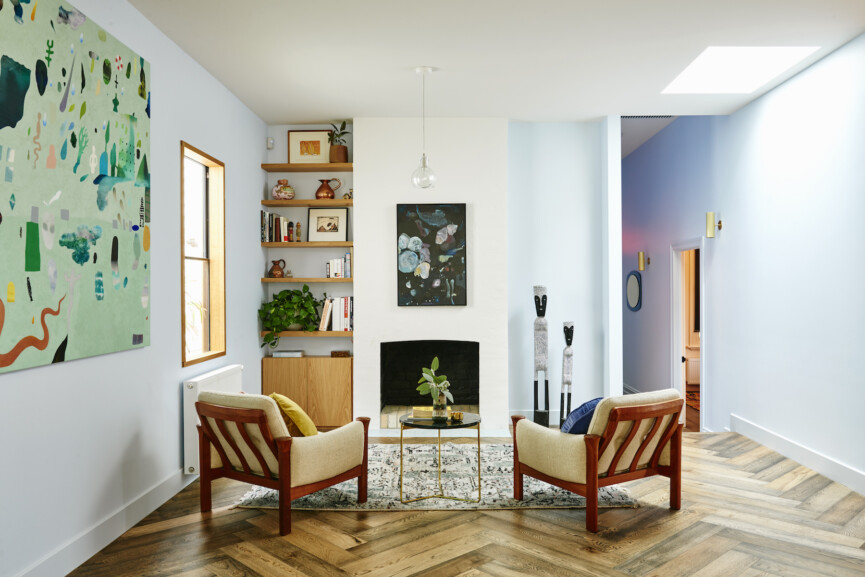
Above photo by Nikole Ramsay.
You may be inclined to think you need a grand-size sofa—but think again, suggests Amy Youngblood. She notes that, when living room space is limited, you may want to skip a full sectional and select a medium or small sofa. You can even opt out of the sofa altogether and bring in a lounge chair or a set of accent chairs “for better egress,” she says.
Idea #10: Add Concentrated Doses of Color
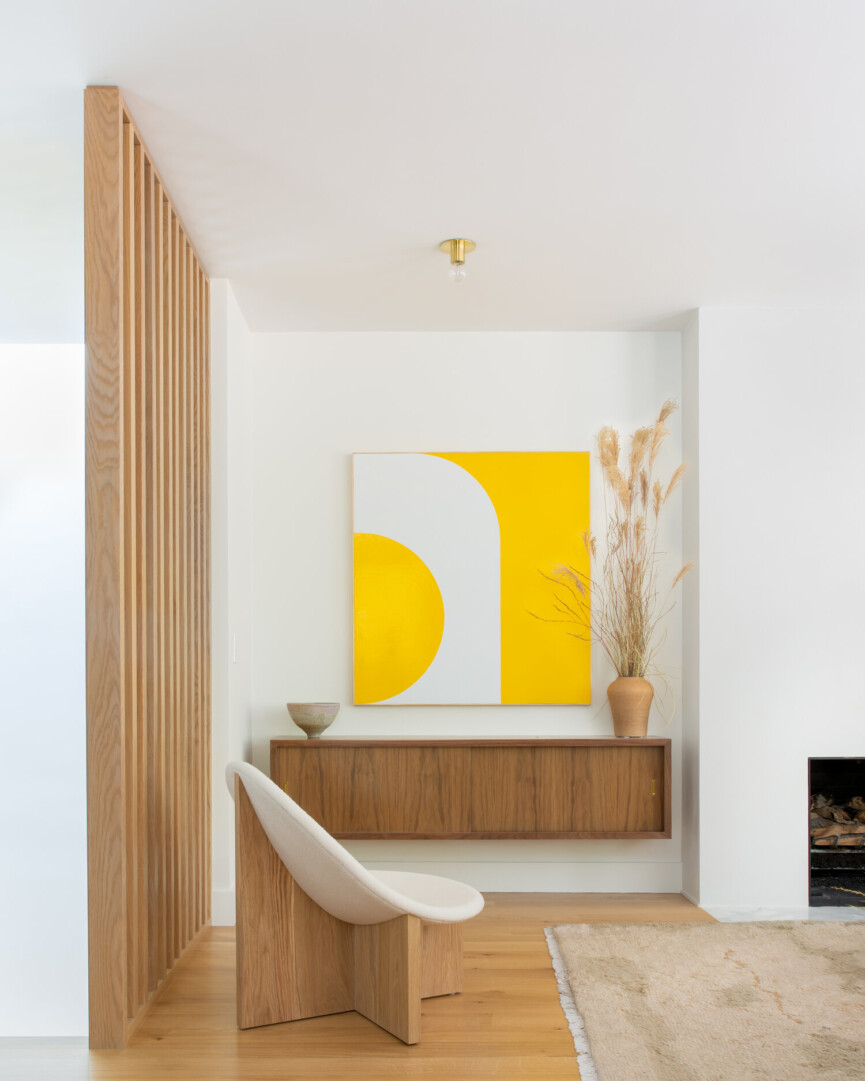
Above photo courtesy of Regan Baker Design.
While honoring tip #4, you can still incorporate punches of vibrant color. Amy Youngblood believes concentrated doses work wonders for small living rooms. She recommends adding in color bursts via artwork, pillows, and vibrant accessories. “This will make your space feel larger but still integrate color,” adds Youngblood. In her San Francisco home, Regan Baker takes a similar approach (see above), adding in doses of yellow via artwork on the walls.
Love to decorate but strapped for space? Share which of these game-changing tips you’ll be bringing into your home.


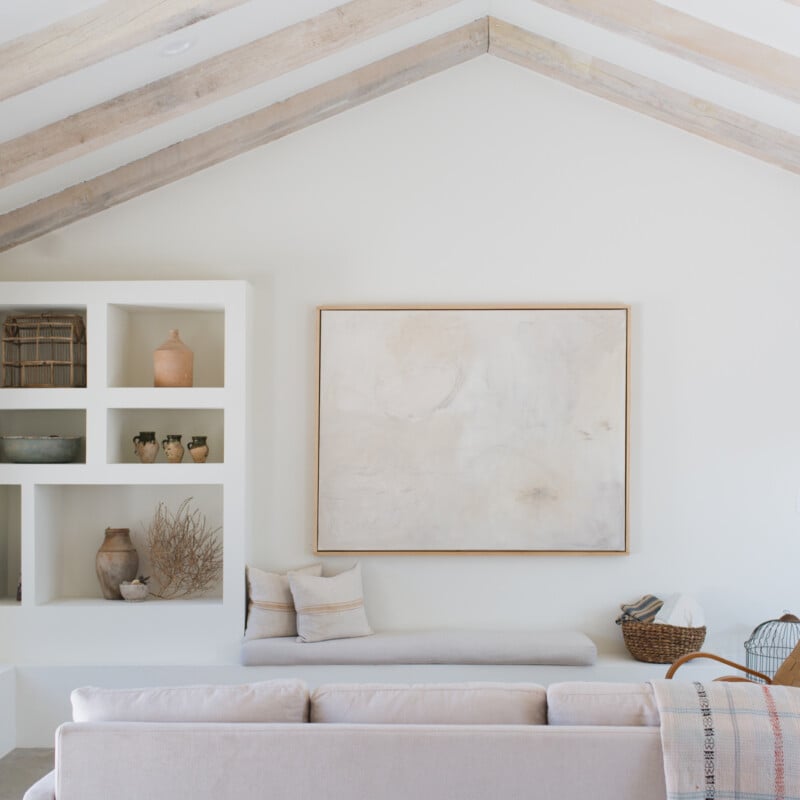
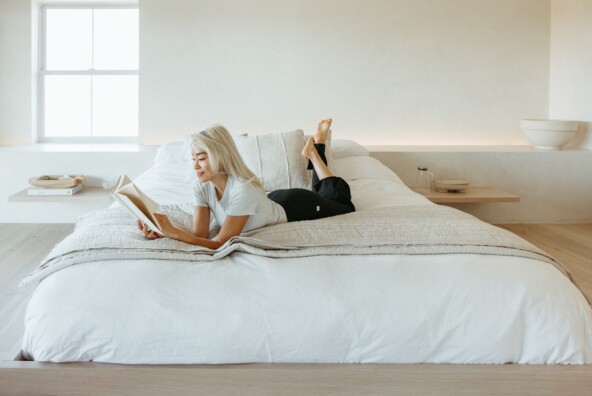
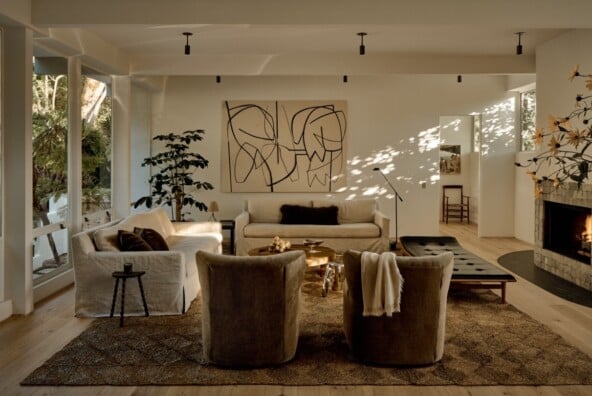
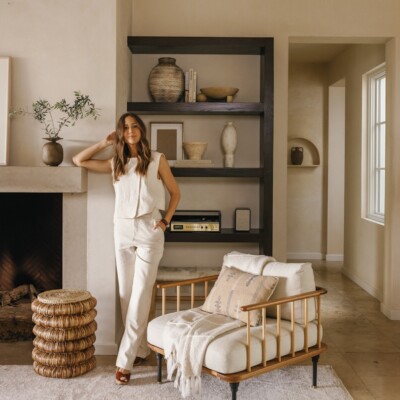
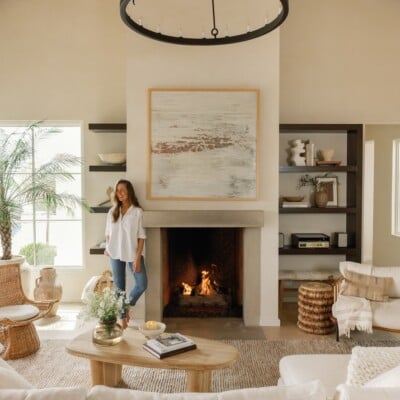
I’d love to see some small space solutions for apartments. I’ve been trying to make my small space livable and beautiful. But it is a struggle.
Loved the ideas ..sheer curtains. 2 chairs instead of couch.
Thanks for posting these small living room tips. I found them very helpful because I have a very small living room & im getting ready to redecorate.
The designs are beautiful. I love them.
thank you